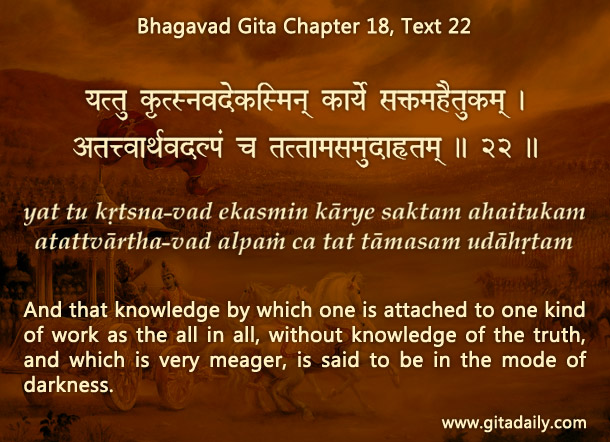In modern history, religious tolerance was promoted primarily to stop the religions in power from persecuting other religions. Though such tolerance is necessary, it is far from sufficient. If people feel that they are just being tolerated, that won’t make for a happy or steady relationship. In a marriage, a spouse wants to feel cherished, not tolerated.
But when a religion teaches that others’ beliefs and behaviors are wrong, how can followers of that religion do anything more than tolerate others? By learning to see that others are more than their problematic beliefs and behaviors. If instead we reduce them to what is wrong in them, we gain what the Bhagavad-gita calls “knowledge in the mode of ignorance” (18.22). This kind of knowledge reinforces our ignorance instead of removing it — though we know a part of reality, we mistakenly equate that part with the whole and believe that we know the whole; consequently, our very knowledge of that part keeps us in ignorance of the whole.
When our knowledge is in the mode of ignorance, we see others in a multi-faith culture as just a set of clearcut religious designations, not as complex conscious beings with multi-faceted personalities. Based on their religious designations, when we disapprove or demean them because of their affiliation with a particular faith-tradition, we blind ourselves to the good qualities they may have: they may be courteous, generous, well-read, socially responsible, environmentally conscious.
By opening ourselves to see people as they are — not as what our preconceived labels tell us who they are — we can at the very least acknowledge that they are human beings just like us. Beyond that, we can appreciate whatever specific good qualities they may have. Further, such appreciation may make us more receptive to understand why they believe and behave the way they do. By that receptivity, we may even see some good in the beliefs and behaviors that we earlier deemed wrong. Then, we may see that God’s grace has already reached them where they are, albeit in a way significantly different from our preconceptions of what God’s grace looks like.
One-sentence summary:
To appreciate others, not just tolerate them, stop seeing others as mere religious designations; start seeing them as they are, with their humanity and their personality.
Think it over:
- What’s wrong with just tolerating others?
- What is knowledge in the mode of ignorance? How does it apply to a multi-faith context?
- How can we learn to appreciate others and their faith?
***
18.22: And that knowledge by which one is attached to one kind of work as the all in all, without knowledge of the truth, and which is very meager, is said to be in the mode of darkness.
To know more about this verse, please click on the image


Appreciate religion with sense